| Posted | Message |
|---|
Paul Bellamy
4/24/2010 1:59:09 PM | As promised, I've been busy scanning again today......
There should be another reel of photos somewhere, but I can't find it or the negatives in the files.
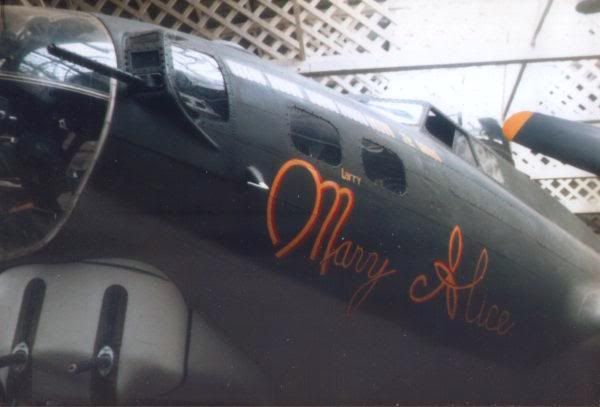
Radio Compass "football" antenna:

Nose hatch:

Looking in from below:

Looking from the navigator's position into the crawlway under the flight deck:

Paul Bellamy

|
Paul Bellamy
4/24/2010 2:05:36 PM | Back of the pilots' instrument panel, seen from the navigator's position:
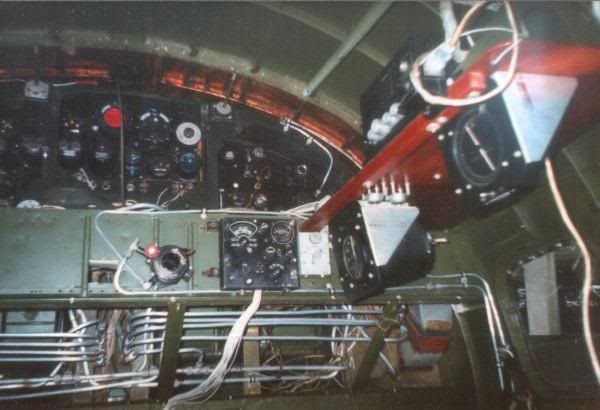
Navigator's instruments:

Back of the flight deck, looking through the bomb bay towards the radio room and tail.
The upper turret would fill the space in the foreground, but only the canopy had been installed at this time:

Bomb bay, looking into the flight deck.
The bomb racks hadn't been installed at the time, which made crossing the bomb bay.... interesting....
especially as I wasn't tall enough to reach the roof to steady myself:

Waist gunners position, with the ammunition hopper and oxygen regulator installed:

Paul Bellamy

|
Paul Bellamy
4/24/2010 2:11:29 PM | Looking from the tail gunner's position forwards towards the waist section.
The gunner's entry hatch is on the right, the domed cowling covers the tail wheel well:
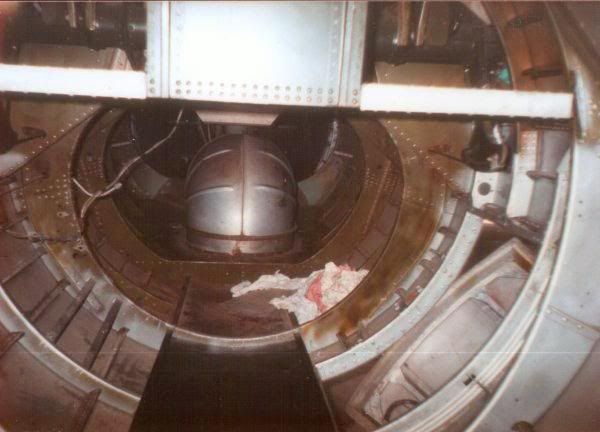
Tail gunner's oxygen regulator:
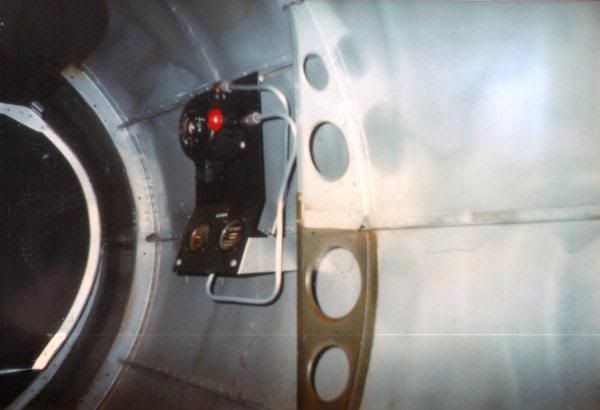
Ball turret, with strike camera hatch at the top of the shot:

Ball turret interior, just before I was invited to try it for size:

Paul Bellamy

|
Paul Bellamy
4/24/2010 2:17:11 PM | No.3 engine nacelle detail.....
Starboard main undercarriage:
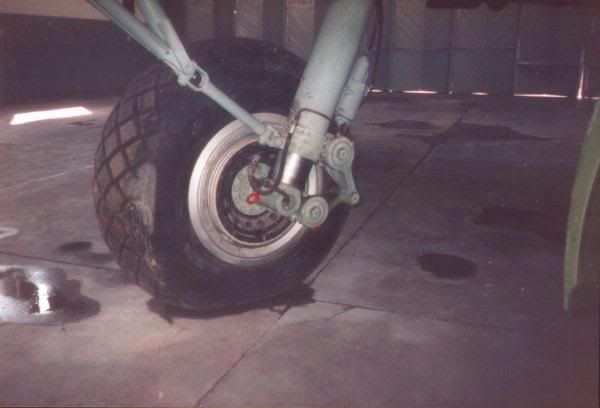
Undercarriage bay, looking forward.
Oil tank upper left, with the retraction jackscrew in front of it:
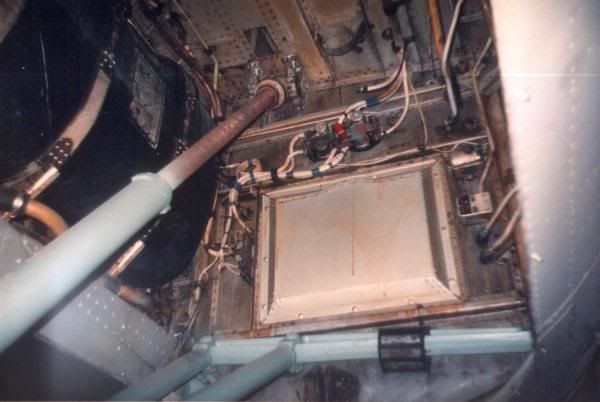
Looking straight up, carburetter air intake pipe in the centre:
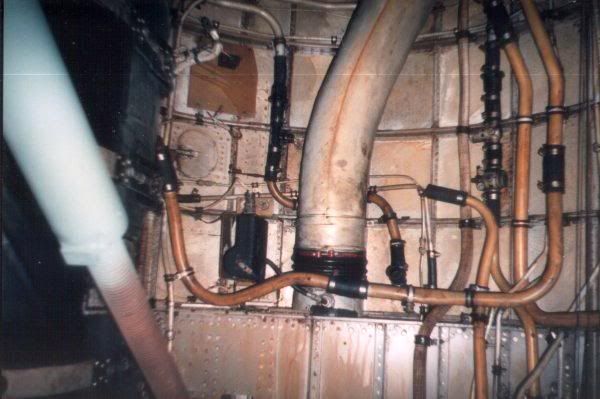
Turning around and facing aft.
The pipe on the left is the exhaust feeding the supercharger:
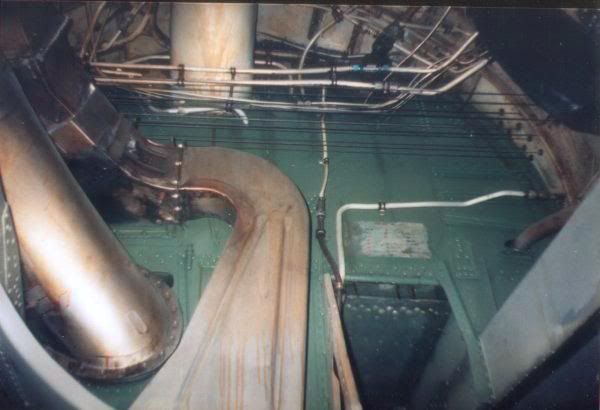
Turbo-supercharger:

All the best,
Paul
Paul Bellamy

|
MaryAlice
4/24/2010 4:28:07 PM | Wow, I guess my Birthday came early this year...thanks Paul!
GREAT shots..wow...up to this point in time, by far and away most detailed pics I have seen of a B-17...outstanding!
Derrick Morris, Grandson of S/Sgt Engr/Top Turret William "Dale" Sartor, 615th BS 401st BG, "Mary Alice"
|
donaldbyers
4/24/2010 4:36:02 PM | Yep pretty detailed and boy she looks CLEAN!!!!
Don
Sgt. Donald C. Byers, 613th Bomb Squadron, Togglier, 42-97344 Carrie B II, KIA 08/24/1944.
|
Paul Bellamy
4/24/2010 6:09:36 PM | Ta chaps,
I'm guessing here, but I think I took these sometime between 1984-86, I'll have to dig the letter from the IWM out to confirm.
All the best,
Paul
Paul Bellamy

|
MaryAlice
4/25/2010 7:19:49 AM | Well, let's see, @ '86 I was getting my drivers license, so..... 😃
And since a "mechanical" aspect has been brought up, I can actually share some technical info (As you guys may or may not remember, I am a car guru, and build race cars/hot rods for a living, and more importantly, been working on them since I can remember, and was able to do my first cylinder head swap when I was 13.)
The picture of the "turbo" charger. Obviously teh turbo has been @ for MANY years, to help with forcing air into an internal combustion engine. Obviously without a turbocharger, that same engine is required to "suck" or pull/draw air into it's cylinders, and with the charger on it, it is able to be force fed that air.
A "turbo" charger is normally used to describe one that is driven by exhaust gases, and a "super" charger is normally referred to when the head unit is driven by a belt. Now, some use both in either instances, but in today's generation, that is how they are referred to, even though the name came about way back when, because they are able to "supercharge" the incoming air.
The "turbo" charger (head unit driven by exhaust gases) is normally regarded as teh most "efficient" of the 2, since it is not "robbing" the engine of power, like a "super" charger (head unit driven by a belt) does. The supercharger, driven by a belt, robs power from teh motor, since teh supercharger's belt is connected to the crank shaft, the crankshaft has to turn over teh supercharger, and it takes power to do that. Now, obviously teh trade off is worth it's weight in gold, since obviously, teh supercharger will add more power to that engine than it takes to "drive" it or turn it over.
I will use an EXTREME example here:
Top Fuel Dragster/Top Fuel Funny Cars:
They are equipped with 500 cubic inch motors, that are fueled by nitromethane, with extremely large "super" charger's (again, driven by a belt connected to the crankshaft) mounted on top of the engine. These superchargers require (at full boost) over 500 horsepower (some say closer to 700 horsepower) JUST TO TURN IT OVER (again, at full boost) So, it "robs" over 500 horsepower from the engine, JUST to be able to turn it over for it to make power. Now, obviously it provides ALOT of power to these motors. There is not a dyno that has been invented to be able to harness the power of one of these motor's, but working with physics and math, they are able to estimate that one of these motors, is making well over 7000 (yes, 7 THOUSAND)horsepower, and some even say over 8000 Horsepower is what is required to accellerate a 2000LB dragster from 0-330 MPH in a 1/4 of a mile that is the powere required to make it happen. Now, of course, you can see teh trade off 500 horsepower to be able to make 7000+ horsepower.
BUT, as you can see, the supercharger DOES have it's limits/shortcomings, since it is NOT as efficient as a "turbo" charger. That being said, teh turbo is not 100% efficient either. Why? Well, it does provide a restriction in the exhaust flow of teh exhaust gases that have been expelled out of the engine. Instead of just being "dumped" into the atmosphere, they are routed through a turbine, and are passed over the turbine wheel, and used to turn the wheel over, and THEN able to escape into teh atmosphere.
Example:
Go out and run a mile, and take your breath (inhale) normally) but everytime you exhale, do it through a straw. Would become difficult to do obviously. That is what teh motor is doing. Now, today's turbochargers have become extremely efficient, and are requiring less and less exhaust gases to turn those turbine wheels over, but they will still ALWAYS have to do that, and hence will ALWAYS have restriction, regardless of how efficient they become, still won't be 100%.
So, that leads teh question...if teh turbo is so efficient, and teh supercharger requires so much power to be driven, why not use teh turbo then. Well, RULES for one thing. In it's top class, NHRA Top Fuel categories, state that ONLY a supercharger can be used, can not use a turbo charger. However, does not mean that a turbo has not been tried in this class, as it WAS tested back in the 80's, with not much success. No need to go ito the why's, that. is for another day.
We could also go into teh different types of superchargers, Roots style, Screw/Whipple Style, and Centrifugal, but that is for another day as well.
Anyways, guess you could call this my morning long winded post..but hope I helped clear up the air on teh turbo/supercharger 🙂
Derrick Morris, Grandson of S/Sgt Engr/Top Turret William "Dale" Sartor, 615th BS 401st BG, "Mary Alice"
|
Paul Bellamy
4/25/2010 7:55:00 AM | While we're getting technical.......... 😉
B-17s are fitted with a two-stage combined forced-induction system, to ensure a constant supply of air at any altitude and power setting.
The exhaust-driven supercharger, as seen above, was called a turbosupercharger at the time, what we would call a turbocharger today. This is the section of the system visible from the outside, and on most G-model B-17s is automatically controlled.
It is only operational in flight, a bypass valve is opened to draw filtered air from inside the wing while on the ground.
The pressurised air from the turbo passes through the carburetter and is then further compressed by a supercharger which is directly mounted on the rear of the engine crankshaft.
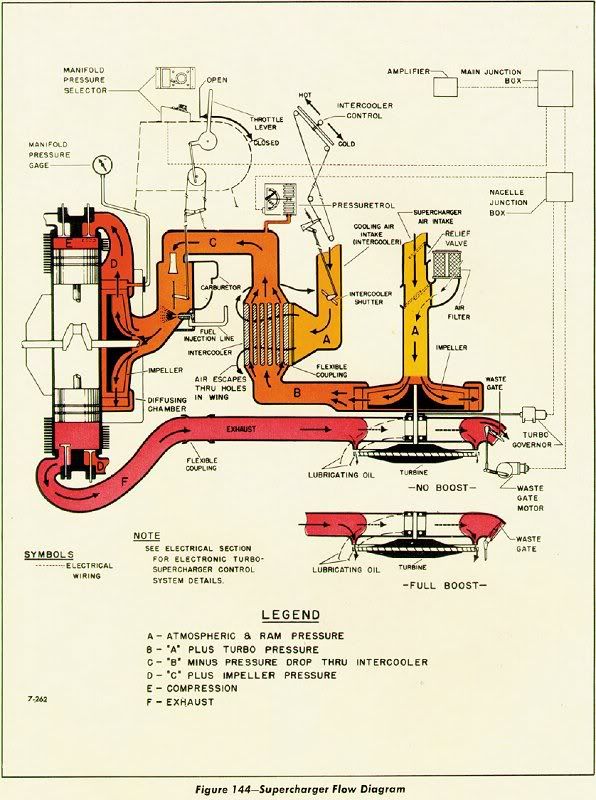
All the best,
Paul
Paul Bellamy

|
MaryAlice
4/25/2010 10:26:05 AM | "Paul Bellamy":
While we're getting technical.......... 😉
B-17s are fitted with a two-stage combined forced-induction system, to ensure a constant supply of air at any altitude and power setting.
The exhaust-driven supercharger, as seen above, was called a turbosupercharger at the time, what we would call a turbocharger today. This is the section of the system visible from the outside, and on most G-model B-17s is automatically controlled.
It is only operational in flight, a bypass valve is opened to draw filtered air from inside the wing while on the ground.
The pressurised air from the turbo passes through the carburetter and is then further compressed by a supercharger which is directly mounted on the rear of the engine crankshaft.

All the best,
Paul
Yes, "back then" it was referred to as a turbosupercharger and also "just" a supercharger. was not really until the 60's/70's that they started being referred more as turbochargers as one, and superchargers as another, and REALLY was not until the mid/late 80's when at that point in time, they were then refered to as turbo or turbocharger as being one unit, and the supercharger, which around this time, also became known as a "blower".
Now, there are instances in time, both "back then" and present day that people refer to each as this or that, but present day, in teh "racing circle", they are refered to as turbos/hairdryer's/turbocharger and superchargers are refered to as blowers, and teh most common are the centrifugal and whipple style blowers (even though Top Fuel Class use a Roots style blower). The centrifugal is widely regarded as a beltdriven turbo as well (even though not called that), because the head unit on a centrifugal blower/supercharger is almost identical to a head unit on a turbo, and they react teh same way, in that teh centrifugal and turbo, produce "lag", which is teh amount of time that you hit the throttle, and teh time the unit proudces "boost". Now, a Whipple style blower, is widely known as producing boost almost instananeous, and has become very popular for teh "street crowd" that races their car on teh street.
Turbos are VERy well known and used in on the race track, because they are able to build boost at teh starting line, by using transbrakes/2 steps/line loc's/high stall converters, etc...and are able to produce boost before light turns green.
So, now back to your point about above....I had NO idea they had teh supercharger in conjunction with the turbo. WOW!! That a great diagram Paul!
And of course, the reason for that is beause the supercharger basically produces boost/ari in constant supply/instantly, while teh turbo does take some time to build tha tboost, and when you run in series, just like you mentioned, it provides airflow/boost at all times, and is done to cars on the street and track today.
Derrick Morris, Grandson of S/Sgt Engr/Top Turret William "Dale" Sartor, 615th BS 401st BG, "Mary Alice"
|